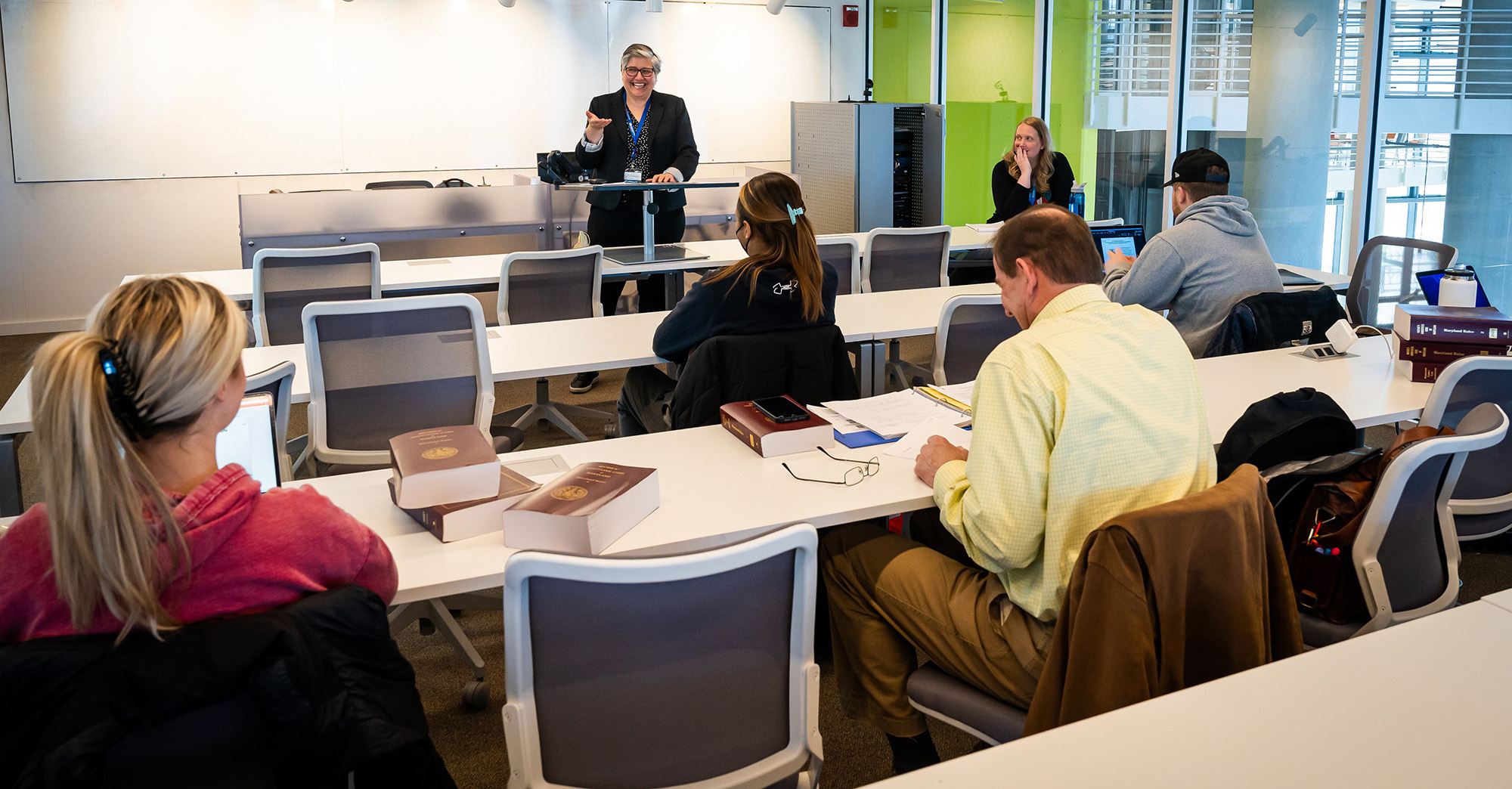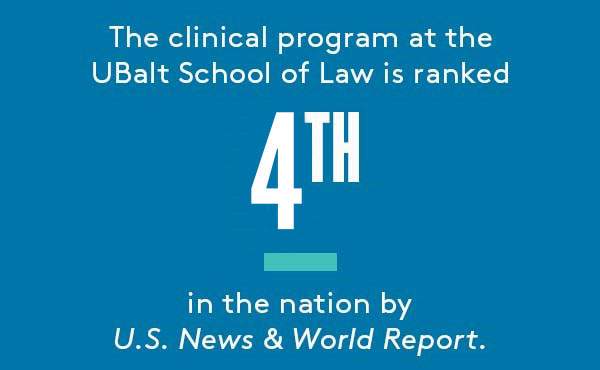Law Clinics

Clinical Education:
Student Attorneys Representing Clients

Under Maryland Rule 19-220, University of Baltimore clinic students represent clients with the supervision of our world-class clinical faculty. When you enroll in the clinical program, you'll learn to be a lawyer in a way you couldn't through classroom work alone. You will meet with clients, research their cases, advocate on their behalf and plan how best to meet their legal needs.
Clinics at the UBalt School of Law
![]()
The Bob Parsons Veterans Advocacy Clinic students help veterans obtain benefits and assist them with other service-related
legal needs. You will develop essential lawyering skills through direct representation,
community outreach projects and legislative advocacy.
Recent accomplishments: Student-attorneys continued to advocate for more Veterans
Treatment Courts in Maryland. Additionally, students represented veterans in VA benefits
appeals, focusing on veterans with mental health issues. In one case, a veteran with
severe depression was discharged after attempting suicide. Student-attorneys drafted
a petition to upgrade her discharge from General to Honorable, which the Navy granted,
making her eligible for educational benefits.
Bronfein Family Law Clinic students learn multidimensional lawyering through litigation, legislative advocacy
and community-based projects. You will represent clients in court seeking civil-protection
orders in cases of domestic violence and family law orders, including divorce, child
custody, child adoption, child support and name changes.
Recent accomplishments: Clinic student-attorneys represented low-income clients in
civil domestic violence cases and in complex divorce, child-custody, child-support
and paternity cases as well as in Special Immigrant Juvenile Status cases. The student-attorneys
conducted trials and hearings, drafted motions and complaints, and conducted innumerable
interviews and legal counseling sessions. Working with the Reproductive Justice Inside
coalition, they researched and wrote a model policy on reproductive health care and
menstrual products for Maryland’s correctional facilities.
The Community Development Clinic provides a wide variety of transactional legal services to and advocacy for historically
underserved communities in Baltimore. You will provide legal representation to community
associations, nonprofit organizations and small-business owners on matters including
business formation, operations and financing, land use and real estate acquisition.
Recent accomplishments: Student-attorneys assisted an urban farming nonprofit in revising
its bylaws and establishing employment policies, advised an educational entrepreneur
about small business formation options, and helped a disaster relief organization
comply with benefit organization laws. To create systemic change, student-attorneys
provided legal and policy support to community residents affected by Baltimore’s water
crisis; this effort led to legislation adjusting water fees for the poor. Student-attorneys
prepared and presented “know your rights” materials to community organizations and
provided pro bono legal advice to prevent tax sales in collaboration with local legal
aid organizations.
The Criminal Practice Clinic places you in a state’s attorney’s or public defender’s office. Under the supervision
of an assistant state’s attorney or an assistant public defender, you will prosecute
or defend people charged with crimes.
Recent accomplishments: Student-attorneys interviewed witnesses, investigated charges,
negotiated pleas and argued motions in court for cases that involved drug possession,
drunken driving, domestic violence and disorderly conduct, among other crimes.
The Immigrant Justice Clinic is a three-credit, one-semester course (offered in the Spring semester only) in which students have the opportunity to learn multiple dimensions of lawyering by engaging in direct client representation under faculty supervision. Students will represent clinic clients in an affirmative application to the Department of Homeland Security. This is not a litigation clinic.
Immigrant Rights Clinic student-attorneys represent low-income immigrants in Immigration Court, in Maryland
Circuit Court and before the U.S. Department of Homeland Security’s Citizenship and
Immigration Services. Caseloads are as diverse as the clinic’s clients. During your
clinical experience, you will touch on many areas of immigration practice—asylum law,
family reunification, detention, naturalization and more—while representing clients
from all over the world.
Recent accomplishments: Clinic student-attorneys represented asylum-seekers from Central
America who had fled gang violence, domestic violence, or a combination of both. Some
clients were families who had been separated and detained at the border. Other clients
came from East Africa, Southeast Asia and the Middle East. Student-attorneys interviewed
clients and witnesses; counseled clients on everything from case strategies to collateral
issues; gathered evidence to prove their clients’ claims; addressed family members’
immigration options; and argued the cases in legal briefs at the asylum office and
in court.
Innocence Project Clinic students learn client-centered lawyering, primarily through investigation and litigation.
You will represent clients claiming factual innocence and will be involved in client,
witness, fact and paper investigation; draft motions and briefs; and negotiate and
argue in trial courts throughout Maryland.
Recent accomplishments: Clinic student-attorneys investigated more than 20 cases of
factual innocence, filed multiple DNA testing petitions in Maryland Circuit Courts
and presented two cases of factual innocence to the Baltimore City State’s Attorney
Conviction Integrity Unit (CIU). In December 2018 and again in May 2019, the clinic,
in connection with the CIU, secured the exoneration of clients who had spent 27 and
24 years, respectively, in prison for crimes they did not commit.
Students in the Legal Data & Design Clinic engage in “digital advocacy,” applying technology and principles of data and design to solve real-world legal problems. Clinic students represent organizational clients and use innovative tools to assist in client litigation, lobbying, law reform, and public education. Clinic students will gain expertise in the use of spreadsheets, pivot tables, SQL databases, visualizations, coding, APIs and more, in order to design applications, create websites, and produce detailed and evidence-informed legal memoranda and briefs.
Although hard technical skills are taught, no specific prior technical experience is required. Substantively, the clinic focuses on the criminal justice domain, and students will learn about, and participate in, criminal justice reform in Maryland. The clinic maintains a course website.
In the Low-Income Taxpayer Clinic, student-attorneys represent taxpayers in federal tax disputes. Cases involve administrative controversies before the IRS and the state comptroller’s office, as well as litigation in federal courts. You will be responsible for all aspects of representing clients, including interviewing and counseling clients, developing case strategy, engaging in fact investigation and discovery, drafting documents, negotiating with adversaries and conducting hearings and trials. You may also appear at the U.S. Tax Court in Baltimore to assist unrepresented taxpayers.
Recent accomplishments: The clinic’s student-attorneys filed its first three tax-refund suits in U.S. District Court, obtaining concessions from the U.S. Department of Justice in two of the three. The clinic’s student-attorneys also litigated more than 12 cases in U.S. Tax Court, obtaining favorable settlements or concessions in most, and successfully negotiated offers to compromise with the IRS on the tax liabilities of numerous low-income clients facing medical issues, financial problems and other serious life events.
As a student in the Mediation Clinic for Families, you will represent clients in the mediation process, co-mediate family law disputes and engage in projects designed to improve the practice of family mediation. Student mediators and attorneys often appear in cases before the Family Division of the Baltimore City Circuit Court, but they also may be involved in mediation in other contexts, such as cases in the Maryland Court of Special Appeals and in international abduction mediations under the Hague Convention. In addition, students may represent clients in collaborative divorces.
Recent accomplishments: Clinic student-attorneys represented clients in mediation and mediated family disputes in the Circuit Court of Baltimore City. Student-attorneys also made presentations about mediation and conflict resolution as part of the Center for Urban Families’ STRIVE Future Leaders Program, which focuses on enhancing career readiness for Baltimore youth.
Students enrolled in the Mental Health Law Clinic will represent and advise children and adults facing involuntary psychiatric civil commitment within the Sheppard Pratt Health System. Administrative hearings are conducted each week and student-attorneys handle cases including the initial interviews of clients, witnesses and experts. Students also conduct case preparation and investigation. They research procedural errors, prepare memoranda and argue motions before administrative law judges. They examine witnesses and advocate for the rights of individual clients. Students also participate in research and preparation of pleadings and memoranda seeking habeas relief and judicial review.
Recent accomplishments: Students met with many adults and children, advising them of the right to postpone cases or admit themselves voluntarily, or to prepare for representation at commitment hearings. Student-attorneys successfully argued for the release of individuals in cases in which procedural errors occurred and in cases on which the merits were at issue. They extensively researched various issues, contacted witnesses and prepared arguments to present to the administrative law judge.
In the Saul Ewing Civil Advocacy Clinic, you will represent low-income clients in civil litigation. Caseloads are diverse and cover many areas of civil practice, including housing, employment, consumer rights, education and public benefits. Under faculty supervision, you will engage in the full range of activities involved in representing clients in litigation. The clinic also takes part in law reform projects to enhance civil legal policy and practice affecting low-income families and children.
Recent accomplishments: Clinic student-attorneys advocated for low-income individuals facing incorrect debt collection actions, tenants living in substandard conditions, individuals seeking to expunge criminal records so they can obtain employment, and elderly individuals defending against unsupported claims from former landlords. They also aided impoverished parents appealing denials regarding their children’s Social Security benefits, and seeking to enforce a judgment against an unscrupulous landlord who moved to a different country.

